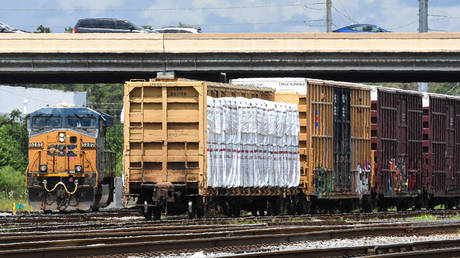Major US railroad strike averted – Biden
A freight rail strike that could have cost the US $2 billion per day has been averted, the White House announced. source:TROIB RTS

The rail industry has worked out a deal with workers relaxing its infamous attendance policy
The rail strike that threatened to shut down freight traffic across the US has been temporarily averted, US President Joe Biden announced on Thursday. A draft agreement by the industry and union reps reached after 20 hours of negotiations will be sent to workers for ratification after several weeks’ “cooling off” period.
“These rail workers will get better pay, improved working conditions, and peace of mind around their health care costs: all hard-earned,” Biden boasted, adding that their employers “will be able to retain and recruit more workers for an industry that will continue to be part of the backbone of the American economy for decades to come.”
Union workers will receive a 24% wage increase over the five-year period from 2020 to 2024 and a retroactive payout for the two years that have already passed under the tentative terms of the deal. The railroads have also agreed to allow unpaid days off for doctors’ appointments and other emergencies that previously came with major disciplinary repercussions.
READ MORE: US rail strike plans threaten further business disruptions
That “brutal” attendance policy, which required workers to be on call 90% of the time, was at the heart of the dispute, and holdout unions had made it clear on Wednesday that they would not agree to any deal without concessions on the issue. The details of the agreement on attendance have not been made public yet, however.
Should the industry’s 115,000 workers have walked off the job at midnight as they had threatened to do if the industry did not heed their demands, it would have been the first railroad workers’ strike in three decades, and an especially devastating one given the ongoing inflation and supply chain crises in the US. Freight rail carries 40% of the nation’s cargo, and by some estimates a rail strike would have cost the country $2 billion every day. The strike would also have disrupted passenger carrier Amtrak, which preemptively shut down its long-distance lines on Wednesday because they use track owned and operated by the freight carriers.












